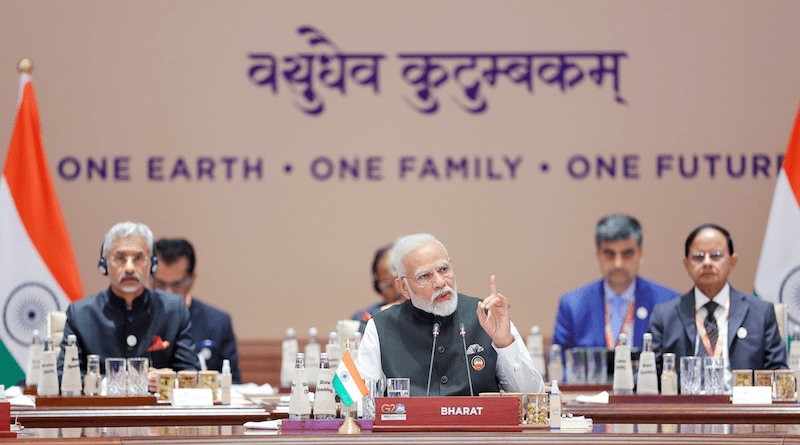African Union Becomes G20 Member – OpEd
Prime Minister Narendra Modi of India, chairing the G20 summit, has confirmed that the Group of 20 nations agreed to grant the African Union (AU) permanent membership status in an appreciable move aimed at offering the continent to have a stronger voice on important questions and to uplift its unto the higher stage.
“On the back of the hard work of all the teams, we have received consensus on the G20 Leaders Summit Declaration. I announce the adoption of this declaration,” Modi told the G20 leaders in New Delhi. He inaugurated the two-day meeting by calling on members to end a “global trust deficit” and announced that the bloc was granting permanent membership to the African Union in an effort to make it more representative.
In its final declaration in New Delhi, the G20 granted the African Union (AU) a full-fledged membership. The provision about the membership was included in the G20’s final declaration, but the membership for AU will be formalized only next year, when Brazil takes over the presidency of G20 from India.
Leaders from the world’s top economies attended summit in India under the theme: “One Earth, One Family, One Future” on September 9 – 10, but the leaders of the Group of 20 nations are riven by sharp geopolitical differences and deep-seated strategic fault lines these few years.
The G20, a forum for the world’s leading economies, discussed several themes such as supply chain resilience, digital transformation, debt distress in developing countries, and climate change goals during its three-day gathering.
According to Russian G20 Sherpa, Svetlana Lukash, earlier told Vedomosti financial newspaper that Russia was one of the first countries to support the AU’s application, which was filed last year by Senegalese President Macky Sall, who chaired the AU in 2022 and called upon the G20 leaders to grant the Africa-wide bloc a permanent seat in the group.
“Russia believes that, once implemented, the initiative of African nations would contribute to strengthening the positions of the majority of countries worldwide and the interests of the Global South,” Lukash said.
Russia’s G20 sherpa recalled that Russian President Vladimir Putin had publicly voiced his support for the AU joining the G20 at the Russia-Africa Summit in St. Petersburg in late July. United States Joe Biden earlier in December 2022 also emphasized AU ascension during the African leaders’ summit held in Washington. So are Germany, Brazil, South Africa and Canada in full support for AU’s membership.
Putin said on July 27 that Moscow expected the African Union to become a full member of the G20 as early as this September. He stressed that Russia considered the AU “as a leading regional organization that forms a modern security structure on the continent and creates conditions for ensuring Africa’s worthy place in the system of global economic ties.”
Prime Minister Narendra Modi of India, currently chairing the G20, also emphasized, in a comment to South Africa’s Mail & Guardian newspaper, that New Delhi was an advocate for the AU gaining full G20 membership.
Modi wrote to the leaders of the G20 nations in June proposing that the AU be given full, permanent membership of the bloc at the upcoming summit in the Indian capital. The AU will have the same status as the European Union.
In an article published across Indian and international newspapers ahead od the summit, Modi wrote, “Our presidency has not only seen the largest-ever participation from African countries but has also pushed for the inclusion of the African Union as a permanent member of the G20”.
Supporting Africa’s application is in India’s real economic interests, as many Indian companies have a footprint on the continent, said Aleksey Kupriyanov, chairman of the South Asia group at the Russian Academy of Sciences’ Primakov Institute of World Economy and International Relations (IMEMO).
According to him, New Delhi is also counting on earning high-profile PR points to burnish its reputation as a Global South leader.
As for the European Union, the fact that African countries have mostly maintained a neutral stance on anti-Russian UN resolutions over Ukraine is a cause for worry in Brussels, thus prompting the bloc to look for ways to influence Africa, one of which is Brussels support for upgrading the continent’s status within the G20, explained Pavel Timofeyev, head of the European Political Research Department at the Institute of World Economy and International Relations.
“Bringing the AU into the G20 would enhance interaction between Russia and the continent and give Russian businesses better market opportunities there,” Natalya Piskunova, associate professor at Moscow State University’s Department of World Politics, concluded.
The African Union has advocated for full membership for seven years, spokesperson Ebba Kalondo said, added that it has also been seeking reforms to a global financial system – including the World Bank, International Monetary Fund and a few other entities.
The importance of this decision for the AU and Africa highlights Africa’s growing role in the global economic system. This move further represents progress from diplomatic intentions to concrete actions in making Africa more visible in the G20, with potential implications for politics, economics, and cultural relations.
In addition, speakers on African issues have strongly called for a pragmatic approach to consider irreversible geopolitical changes, particularly in international financial and economic organizations, to create a more equitable global governance system.
United Nations Secretary-General Antonio Guterres attended as an observer, with the heads of the IMF and the World Bank also in attendance. A delegation from the only African nation in the G20, South Africa, headed by President Cyril Ramaphosa. Among the few African guests was Nigerian President Bola Ahmed Tinubu.
According to official documents, Russian President Vladimir Putin and Chinese President Xi Jinping skipped summit in the capital New Delhi. The G20 consists of 19 countries and the European Union, making up about 85 percent of global GDP and two-thirds of the world’s population.

